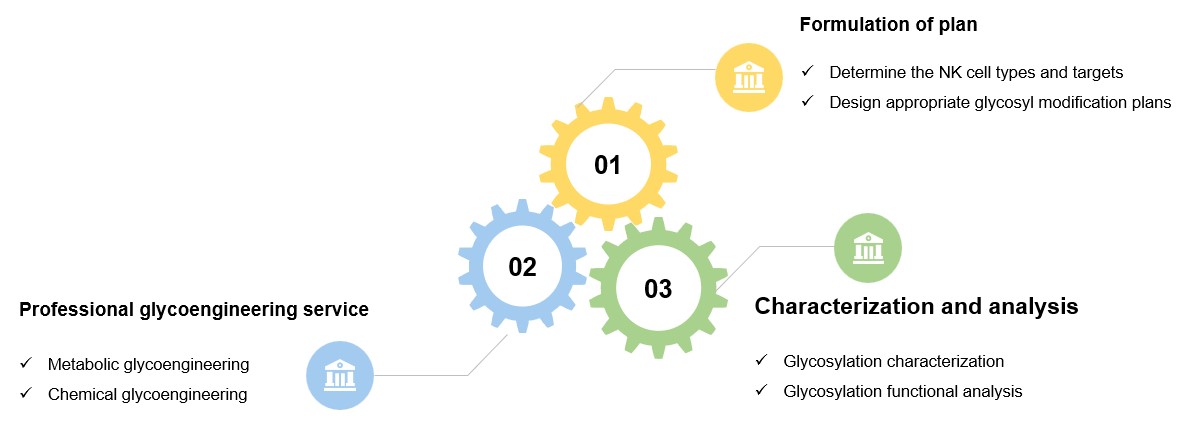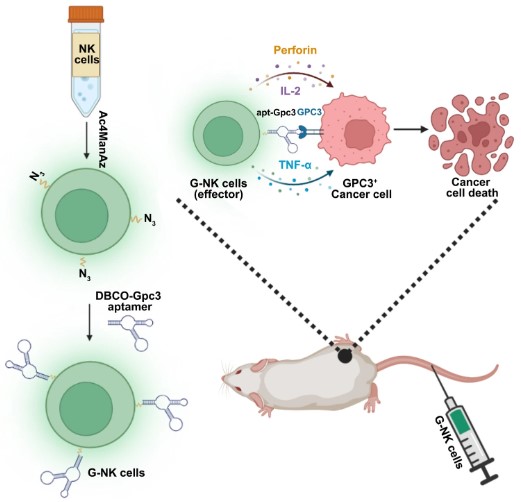NK Cell Glycoengineering Service
NK Cell-based Metabolic and Chemical Glycoengineering Services at Creative Biolabs
NK cells (natural killer cells) are an important type of immune cell and a type of lymphocyte, which recognizes and kills target cells without being restricted by the major histocompatibility complex (MHC). This makes them critical for detecting and removing abnormal cells. Creative Biolabs has developed a professional Cell Line Glycoengineering platform, and our strong technical team provides clients with mature NK cell glycoengineering services.
-
Formulation of plan
According to client needs, we determine the NK cell types and targets that need to be improved and design appropriate glycosyl modification plans, including selecting glycosyl types, modification sites, quantity, structure, etc.
-
Professional glycoengineering service
NK cells glycoengineering services involve multiple methods, such as metabolic glycoengineering and chemical methods.
-
NK cell-based metabolic glycoengineering service
Metabolic glycoengineering of NK cells mainly affects the glycosyl structure and metabolic pathways of NK cells by changing the sugars or metabolic substances in the culture medium to achieve glycosyl modification. First, we select appropriate culture conditions to ensure the normal growth and functions of NK cells. Then, sugars or metabolic substances with special glycosyl structures are added to the culture medium. These precursors will enter the NK cells and participate in the glycosyl synthesis process, thereby achieving the modification of the glycosyl. For example, we exploit the biosynthetic pathway of sialic acid and introduce sialic acid derivatives onto the surface of NK cells through metabolic sugar engineering, thereby achieving sialic acid modification on the cell surface.
-
NK cell-based chemical glycoengineering service
The chemical method is to directly introduce specific glycosyl structures on the surface of NK cells. For example, we use click chemistry technology to combine designed click chemical reagents (such as dibenzocyclooctyne (DBCO)) with corresponding receptors on the surface of NK cells to form stable glycosyl modifications.
-
Characterization and analysis
We provide characterization and analysis for modified NK cell samples. We use mass spectrometry (MS) to confirm the type and location of glycosyl modifications and use flow cytometry to detect the impact of glycosyl modifications on NK cells, such as recognition rate and activity. In addition, we provide functional analysis for modified NK cells to evaluate the activity, toxicity, and other biological properties of modified NK cells.
Immune Cell Glycoengineering (such as NK cells and T Cell Glycoengineering) is a promising new method for cancer treatment, which complements the current immune cell genetic engineering strategies. Glycosyl modification can enhance the activity and immune response characteristics of NK cells, and improve their ability to recognize and kill target cells. Moreover, through glycosyl engineering technology, new NK cell immunotherapy can be developed and provide important support for the development of personalized treatment. Creative Biolabs will use its mature cell line glycoengineering platform to provide first-class NK cell glycoengineering services to global clients. In addition, we use glycoengineered NK cells as an effective production platform to produce therapeutic proteins with specific glycosyl modifications, thereby improving their efficacy and bioavailability. Please contact us if you need to know more details.
 Fig.1 Glycoengineering and glycosylation analysis for NK cells.
Fig.1 Glycoengineering and glycosylation analysis for NK cells.
Published data
GPC3 protein is overexpressed in the serum of hepatocellular carcinoma (HCC), and NK cells can specifically target GPC3 protein, which provides an idea for cancer immunotherapy. The authors chose DBCO-modified GPC3 as an aptamer and modified it on the surface of NK cells (G-NK cells) through metabolic glycan engineering and click chemistry technology, thereby endowing NK cells with the ability to specifically target cancer cells. The authors then evaluated the specific targeting properties and cytotoxicity of G-NK cells in vitro. The results showed that compared with unmodified NK cells, G-NK cells could specifically bind to GPC3+ tumor cells and induce cell apoptosis and necrosis, thus improving the efficiency of immunotherapy. This study provides an approach for cell therapy of HCC.
 Fig.2 Schematic diagram of cancer immunotherapy.1, 2
Fig.2 Schematic diagram of cancer immunotherapy.1, 2
FAQs
Q1: What specific NK cell glycoengineering services can you provide for my research?
A1: We provide services such as glycosyl modification scheme design, chemical modification and metabolic glycoengineering, post-modification characterization, and analysis for NK cells to help clients advance project research.
Q2: How to evaluate the functions and effect of NK cells after glycosyl modification?
A2: We evaluate the biological properties and activity of modified NK cells through functional tests such as cytotoxicity tests and immunomodulation analysis to quantify the impact of glycosyl modification on NK cell functions.
Q3: Are modified NK cells safe? What are the potential applications?
A3: We will conduct in vivo verification experiments to ensure the safety of the modified NK cells while exploring their application potential in cancer treatment, immunotherapy, and other fields.
Customer Review
Outstanding achievements in glycosylation
"The NK cell glycoengineering service carried out at Creative Biolabs, the modified NK cells showed high activity in multiple functional tests, proving the effectiveness of glycoengineering. These results provide important support and direction for my research."
Professional level
"The Creative Biolabs service team did an excellent job, they demonstrated excellent expertise in the field of NK cell glycoengineering and ensured I had a clear understanding of every aspect of the project through in-depth discussions and explanations. They also adhered to a strict timeline and completed it efficiently project, their time planning and resource management were impressive."
References
-
Zheng, Youshi, et al. "Natural killer cells modified with a Gpc3 aptamer enhance adoptive immunotherapy for hepatocellular carcinoma." Discover Oncology 14.1 (2023): 164.
-
Under Open Access license CC BY 4.0, without modification.
For Research Use Only.
Related Services

 Fig.1 Glycoengineering and glycosylation analysis for NK cells.
Fig.1 Glycoengineering and glycosylation analysis for NK cells.
 Fig.2 Schematic diagram of cancer immunotherapy.1, 2
Fig.2 Schematic diagram of cancer immunotherapy.1, 2

